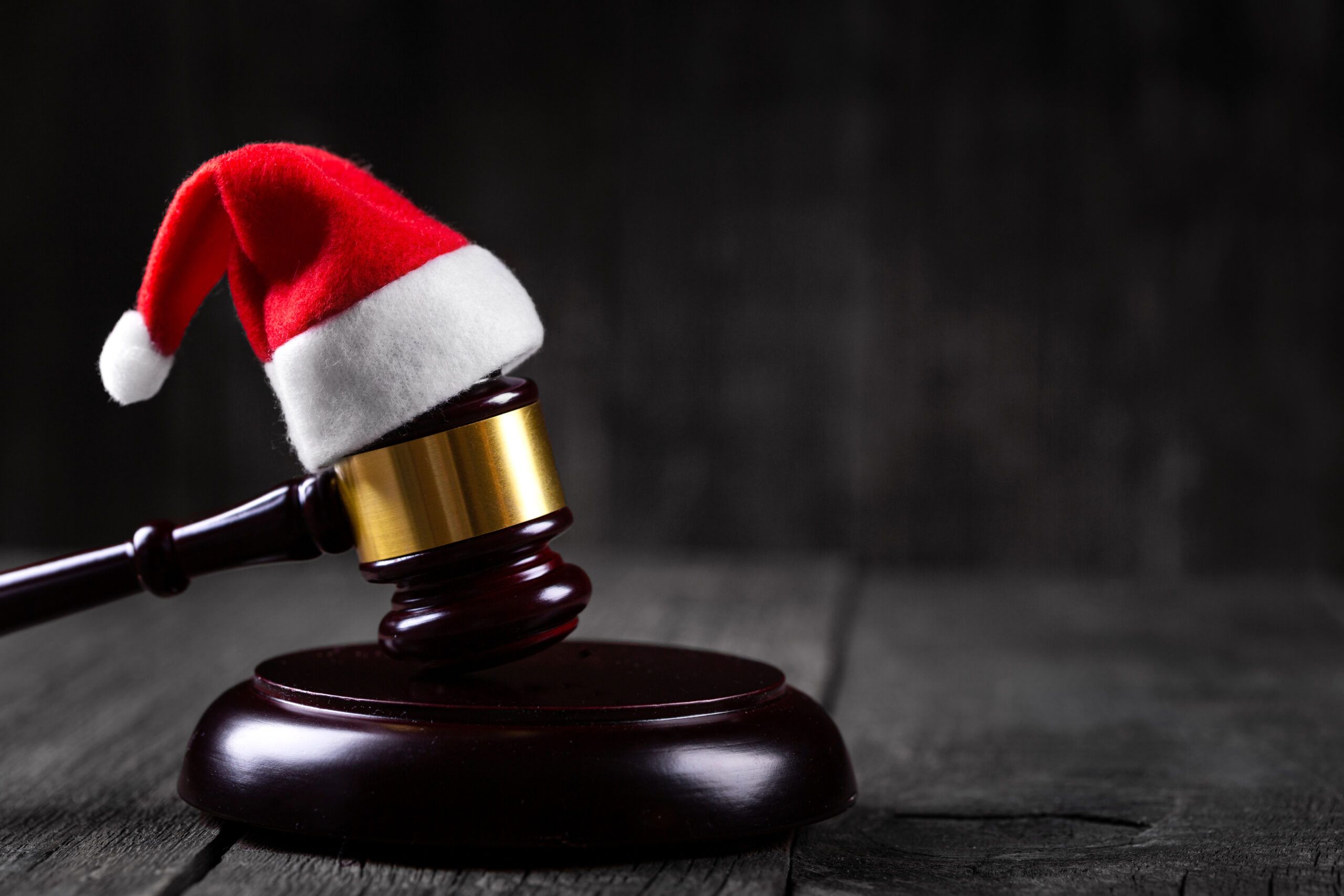FEATURE ARTICLE: If Santa Were a Lawyer
Author: Professor Michael H. Hoeflich, PhD, Editor-in-Chief
Legal Editor: Carrie E. Parker; Design & Publishing Editor: Matthew T. Stephens
This article is featured in Volume 5, Number 11 of the Legal Ethics and Malpractice Reporter, published November 30, 2024.
The month of December is a bit different from other months for most of us. As winter closes in upon us, the days get shorter, and the glorious colors of fall become a memory, many of us embrace the warmth and brightness of the holidays. We put up lights on our houses, we cook warming dishes, and we treat our children and grandchildren to holiday treats. Central to millions of families are the various stories we tell, and one such major story is that of Saint Nickolas or, as he is popularly known in this country, Santa Claus.
Santa has a long history. The original seems to date to the third century and a Syrian saint beloved for his charity and good works. By the Middle Ages, veneration of St. Nickolas spread across Europe. Santa apparently came to the United States with the Dutch colonization of New York and was named by Washington Irving as the patron saint of New York City. His popularity has grown ever since in art and children’s tales. But Santa is not a mere human being. He brings toys to good children but lumps of coal to those who have misbehaved. He keeps a tally throughout the year and judges whether each of us has been naughty or nice. He has come to expect a treat when he comes down the chimney (a cookie or sweetmeat will never be disdained).
When we speak of Santa, we know what he does one day a year, the day when he delivers presents in his magical sleigh. But what of the other 364 days? We assume that he supervises his workshop at the North Pole, but the work is done by elves. It may well be that Santa has another job when not occupied in his toy making business. Perhaps, Santa is a member of the bar. And, if he is, then he must be subject to the Rules of Professional Responsibility. Let us imagine, as a holiday thought experiment, that Santa’s Kingdom has adopted the Kansas Rules of Professional Conduct and that Santa is subject to those rules as a member in good standing of the North Pole Bar. What would that be like?
First, we must acknowledge that the Rules, while concentrating on a lawyer’s professional activities, are not confined to these alone. Most important in this respect is Rule 8.4:
It is professional misconduct for a lawyer to:
a) Violate or attempt to violate the rules of professional conduct, knowingly assist or induce another to do so, or do so through the acts of another;
b) commit a criminal act that reflects adversely on the lawyer’s honesty, trustworthiness or fitness as a lawyer in other respects;
c) engage in conduct involving dishonesty, fraud, deceit or misrepresentation;
d) engage in conduct that is prejudicial to the administration of justice;
e) state or imply an ability to influence improperly a government agency or official;
f) knowingly assist a judge or judicial officer in conduct that is a violation of applicable rules of judicial conduct or other law; or
g) engage in any other conduct that adversely reflects on the lawyer’s fitness to practice law.
Comment 2 to Rule 8.4 explains:
Many kinds of illegal conduct reflect adversely on fitness to practice law, such as offenses involving fraud and the offense of willful failure to file an income tax return. However, some kinds of offense carry no such implication. Traditionally, the distinction was drawn in terms of offenses involving “moral turpitude.” That concept can be construed to include offenses concerning some matters of personal morality, such as adultery and comparable offenses, that have no specific connection to fitness for the practice of law. Although a lawyer is personally answerable to the entire criminal law, a lawyer should be professionally answerable only for offenses that indicate lack of those characteristics relevant to law practice. Offenses involving violence, dishonesty, or breach of trust, or serious interference with the administration of justice are in that category. A pattern of repeated offenses, even ones of minor significance when considered separately, can indicate indifference to legal obligation.
Might Santa run afoul of Rule 8.4 on his Christmas rounds? We assume that Santa would never be guilty of any form of “moral turpitude,” given his reputation as a saint, or holy man. But would a disciplinary panel deem any of his actions an ill reflection upon his fitness as a lawyer and upon the legal profession as a whole?
Let us assume that the disciplinary panel chair is Mr. Ebenezer Scrooge, of Dickensian fame. He will be looking carefully at everything Santa does on Christmas. His first question will be whether his magic sleigh is properly licensed and whether he has paid the necessary personal property tax on it. Pursuant to Comment 2 to Rule 8.4:
Many kinds of illegal conduct reflect adversely on fitness to practice law, such as offenses involving fraud and the offense of willful failure to file an income tax return. However, some kinds of offense carry no such implication.
Failure to license a magic sleigh certainly does not fit within the kinds of criminal offenses generally regulated by Rule 8.4. But what if Santa has not paid his personal property taxes? Comment 2 mentions income taxes but not property tax. While Mr. Scrooge may well be inclined to find a violation of Rule 8.4 here, it seems doubtful it would hold up.
There are, however, at least two other potentially serious violations of Rule 8.4. Santa is a citizen of his own kingdom at the North Pole. If he is not a United States citizen and does not have a visa to spend time in the U.S., then he is very likely in violation of U.S. immigration laws—which are strict and getting stricter. Indeed, Santa may well be an undocumented alien. As such, his presence in this country could constitute a serious crime. Would a violation of U.S. immigration laws constitute a serious crime reflecting upon Santa’s fitness to practice law? Mr. Scrooge may well have hit the jackpot on this one, and Santa may face sanctions.
The third potential violation of Rule 8.4 is also potentially serious, if not felonious. Santa does not knock on the doors of the homes he enters. Instead, he enters through the chimney secretly, when the children of the house are asleep in their beds. Does he have permission to do so, or is he housebreaking? If it is the latter, he is, again, in violation of the law, which could put him in ethical jeopardy. If an ordinary member of the bar was caught entering a stranger’s house through the chimney, he would be arrested and prosecuted criminally, which almost always results in a disciplinary proceeding.
Finally, there is the matter of the cookies and milk. If they have been left by the hearth as a gift for Santa, there should be no problem. But what if Santa, not finding them by the fireplace, goes looking in the kitchen and takes nourishment without permission? We are back in the criminal realm! And a disciplinary charge pursuant to Rule 8.4 is soon to follow.
Perhaps there are some lessons we can learn here. First, Ebenezer Scrooge and others of his anti-Christmas inclination ought not serve on Santa’s disciplinary panel. His obvious bias should at the least require recusal. Second, authorities might choose to decide that, when dealing with beloved saints and magical sleighs, the application of the Rules should be informed by the holiday spirit rather than the strict letter of the law and regulations so that peace, joy, and the laughter of children should prevail.
Happy holidays.
READ THE FULL ISSUE OF LEMR, Vol. 5, No. 11
About Joseph, Hollander & Craft LLC
Joseph, Hollander & Craft is a mid-size law firm representing criminal defense, civil defense, personal injury, and family law clients throughout Kansas and Missouri. From our offices in Kansas City, Lawrence, Overland Park, Topeka and Wichita, our team of 25 attorneys covers a lot of ground, both geographically and professionally.
We defend against life-changing criminal prosecutions. We protect children and property in divorce cases. We pursue relief for clients who have suffered catastrophic injuries or the death of a loved one due to the negligence of others. We fight allegations of professional misconduct against medical and legal practitioners, accountants, real estate agents, and others.
When your business, freedom, property, or career is at stake, you want the attorney standing beside you to be skilled, prepared, and relentless — Ready for Anything, come what may. At JHC, we pride ourselves on offering outstanding legal counsel and representation with the personal attention and professionalism our clients deserve. Learn more about our attorneys and their areas of practice, and locate a JHC office near you.











